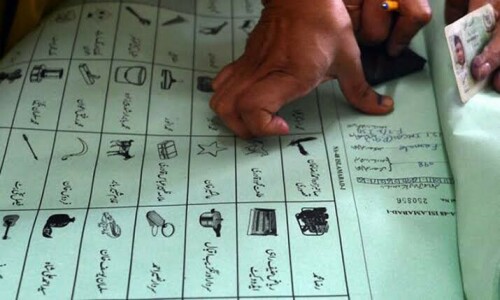WASHINGTON, April 23: A senior US official indicated on Wednesday that Pakistan had taken the United States into confidence before initiating a dialogue with the militants and said that the US was not against any talks that would lead to peace.
Assistant Secretary of State Richard Boucher told a briefing that the United States, however, wanted to ensure that the pledges to end violence and militant activities in the tribal areas were enforced.
“A little bit,” said Mr Boucher when asked if Pakistan had consulted the United States before engaging the militants. “These are the things that we discuss with Pakistani officials all the time … this has been a regular subject of conversation with the government of Pakistan.”
Signalling US endorsement of Pakistan’s move, the senior State Department official said: “It is important to negotiate with the tribes …to end violence, to end suicide bombing and to end the plotting and planning that happens there. The problem is in enforcement … it is the outcome that matters.”
Mr Boucher said he had discussed subjects like security and economic development of the tribal areas with Pakistani authorities also when he visited Islamabad last month with Deputy Secretary of State John Negroponte.
He said that although there were no talks on the deal now being negotiated when he visited Islamabad, the Pakistanis must have kept the US Embassy in Islamabad informed.
“We are very much aware of the ideas and efforts the government of Pakistan makes (for bringing peace to the tribal region) and we support them.”
Mr Boucher, who looks after South and Central Asian affairs at the State Department, said he had a long meeting with a tribal delegation from Pakistan and Afghanistan earlier on Wednesday where the subject of negotiations with the militants was also discussed.
Mr Boucher said that Baitullah Mehsud was one of several militant leaders that Pakistan had engaged for talks, adding that similar talks were being held in Mohmand Agency and other tribal areas as well.
Mr Boucher’s position on the talks with the militants was apparently different from that of the White House which said earlier on Wednesday that it had “concerns” over Pakistan’s decision to engage the militants.
White House spokeswoman Dana Perino cautioned Islamabad that the talks should not halt the ongoing military operations against the militants.
“We are concerned about it,” said Ms Perino when asked to comment on Pakistan’s latest effort to conclude a deal with the warring Mehsuds aimed at restoring peace in the volatile South Waziristan region.
“What we encourage them to do is to continue to fight against the terrorists and to not disrupt any security or military operations that are ongoing in order to help prevent a safe haven for terrorists there,” she said.
Mr Boucher, however, responded different when asked for comments.
“I don’t understand the question that it is new, it has not been done before, has not worked in the past,” he said when a reporter suggested that Pakistan had negated US policies on this issue by bringing a new element, the negotiations.
Mr Boucher recalled that from the British to President Musharraf, every government that ruled this area had negotiated with the tribes living along the Pakistan-Afghan border.
He said that when the Musharraf government came to Washington with a proposal for talks with the militants in 2006, the United States did not oppose it.
The previous agreement, he said, included clauses that banned all Taliban and Al Qaeda activities in the tribal belt and required the militants to shun violence.
“We said, may be it will work … but by the end of the year, it was not working,” he added.
He said there was nothing wrong with what the two sides had signed on the paper, “the problem was in enforcement”.
The United States, he said, supported all efforts Pakistan was making to bring peace and stability to the tribal region, which included strengthening the Frontier Corps, providing education, creating jobs and economic opportunities for the people living there.
“We also support the political context”, behind these efforts, he added.













































Dear visitor, the comments section is undergoing an overhaul and will return soon.